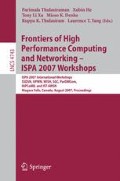Abstract
The Knapsack problem is an NP-Complete problem. Unbounded Knapsack problems are more complex and harder to solve than the general Knapsack problem. In this paper, we apply the genetic algorithm to solve the unbounded Knapsack problem. We use an elitism strategy to overcome the defect of the slow convergence rate of the general genetic algorithm. The elitism strategy retains good chromosomes and ensures that they are not eliminated through the mechanism of crossover and mutation, while ensuring that the features of the offspring chromosomes are at least as good as their parents. The system automatically adapts the number of the initial population of chromosomes and the number of runs of the genetic algorithm. In addition, we use the strategy of greedy method to auto adaptive the sequence of chromosomes to enhance the effect of executing. Experimental results showed that our method could fast find the best solution of the problem.
Access this chapter
Tax calculation will be finalised at checkout
Purchases are for personal use only
Preview
Unable to display preview. Download preview PDF.
References
Holland, J.H.: Adaptive in Natural and Artificial Systems. MI: Univ. Michigan Press, Ann Arbor (1975)
Kellerer, H., Pferschy, U., Pisinger, D.: Knapsack problems, pp. 3–540. Springer, Berlin (2004), ISBN 3-540-40286-1
Costa, J., Tavares, R., Rosa, A.C.: An experimental study on dynamic random variation of population size. In: Proc. of the1999 IEEE Internet. Conf. on Systems, Man, and Cybernetics, pp. 607–612 (1999)
Li, K.-L., Guang-Mingdai, Li1, Q.-H.: A genetic algorithm for the unbounded Knapsack problem. Computer School, Huazhong University of Science and Technology, Wuhan, 430074, China, Departtnent of Computer, China University of Geo Science (2003)
Zhou, L., Shi-Xin, S.: A Self-Adaptive Genetic Algorithm for Tasks Scheduling in Multiprocessor System. In: Communications, Circuits and Systems Proceedings, International Conference (2006)
Negnevitsky, M.: Artificial Intelligence: A Guide to Intelligent Systems, 2nd edn. Addison-Wesley, Reading (2004)
Haupt, R.L.: Optimum Population Size and Mutation Rate for a Simple Real Genetic Algorithm that Optimizes Array Factors. In: Antennas and Propagation Society International Symposium, IEEE, Los Alamitos (2000)
Yun, Y.S., Mukuda, M., Gen, M.: Reliability Optimization Problems Using Adaptive Hybrid Genetic Algorithms. Advanced Computational Intelligence and Intelligent Informatics 8(4), 437–441 (2004)
Yun, Y.S.: Hybrid genetic algorithm with adaptive local search scheme. Computers & Industrial Engineering 51, 128–141 (2006)
Liu, Z.: New adaptive genetic algorithm based on ranking. In: Proceedings of the Second International Conference on Machine Learning and Cybernetics, X.’an (November 2-5, 2003)
Author information
Authors and Affiliations
Editor information
Rights and permissions
Copyright information
© 2007 Springer-Verlag Berlin Heidelberg
About this paper
Cite this paper
Chen, RC., Jian, CH. (2007). Solving Unbounded Knapsack Problem Using an Adaptive Genetic Algorithm with Elitism Strategy. In: Thulasiraman, P., He, X., Xu, T.L., Denko, M.K., Thulasiram, R.K., Yang, L.T. (eds) Frontiers of High Performance Computing and Networking ISPA 2007 Workshops. ISPA 2007. Lecture Notes in Computer Science, vol 4743. Springer, Berlin, Heidelberg. https://doi.org/10.1007/978-3-540-74767-3_21
Download citation
DOI: https://doi.org/10.1007/978-3-540-74767-3_21
Publisher Name: Springer, Berlin, Heidelberg
Print ISBN: 978-3-540-74766-6
Online ISBN: 978-3-540-74767-3
eBook Packages: Computer ScienceComputer Science (R0)

